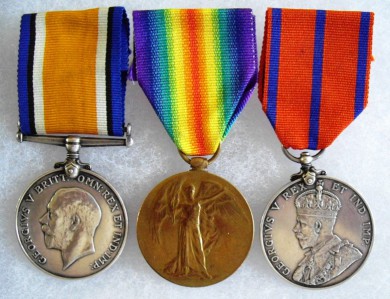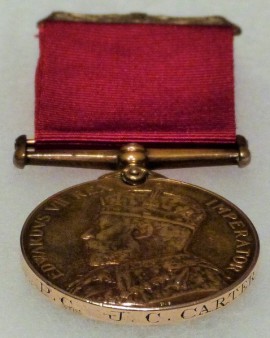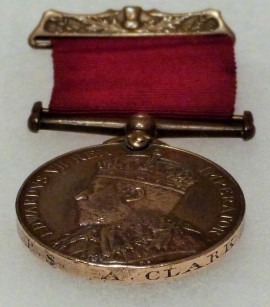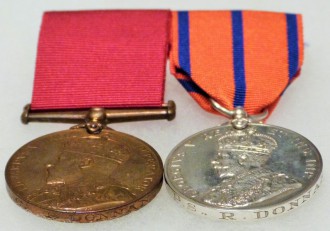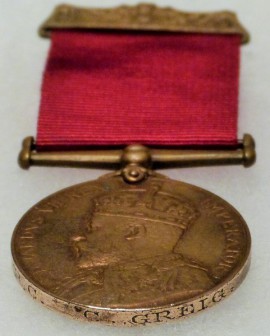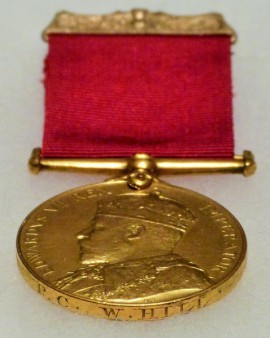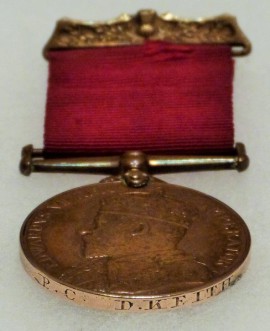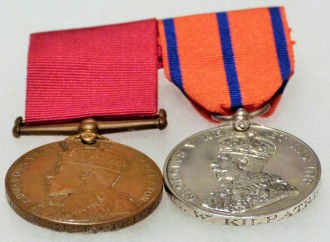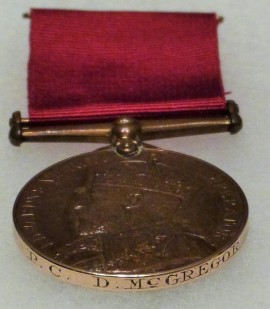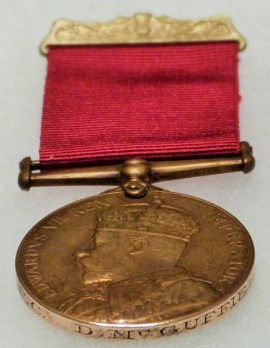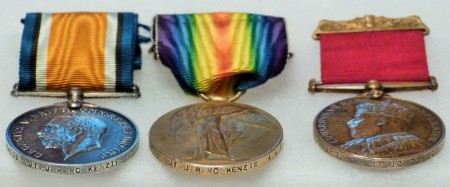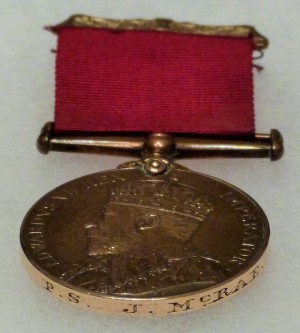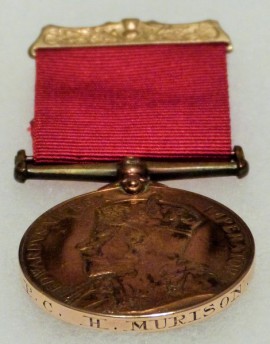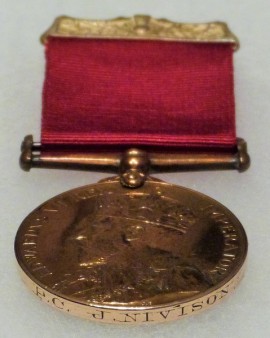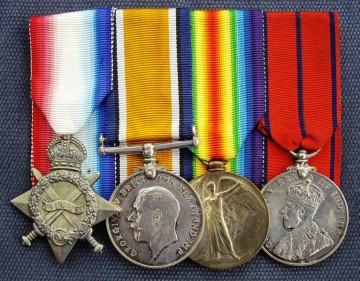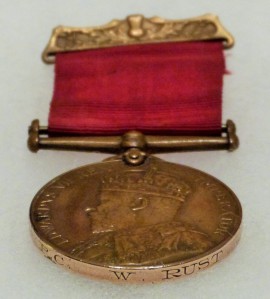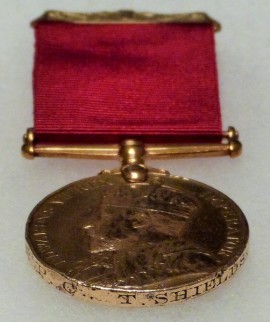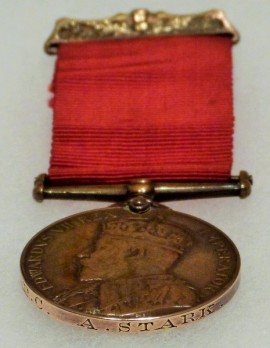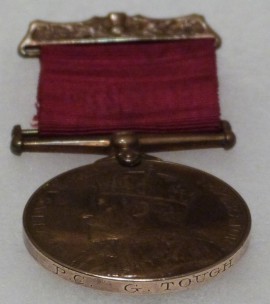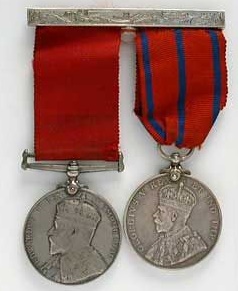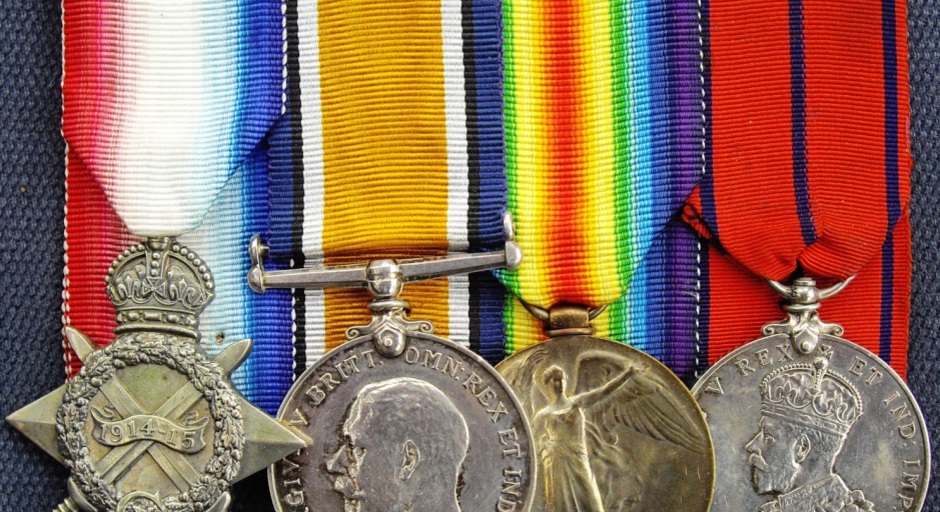
City of Glasgow Police 1800 - 1975
This section features medals to officers from City of Glasgow Police.
To see medals from:
Scottish City & Burgh Police Forces &
Click on the links above.
PC John Cape City of Glasgow Police
British War Medal
Victory Medal
King George V Coronation (Scottish Police) Medal 1911
City of Glasgow Police
PC John Cape
John Cape was born in Cumbria on 25 March 1883. he joined City of Glasgow Police on 5 February 1908 and was posted to Southern (D) Division.
The 11 October 1912 edition of The Police Review and Parade Gossip confirm his award of the King George V Coronation (Scottish Police) Medal 1911 while still serving in Southern Division.
He resigned on 19 September 1916 and joined 2/2 Scottish Horse as Private 6050. He later transferred to first the Military Foot Police and then the Military Mounted Police and served in Egypt. His MFP/MMP number was P-5846.
His Medal Index Card and Enlistment papers confirm his service and medal entitlement.
He survived the war and was re-appointed to the City of Glasgow Police on 16 July 1919.
He resigned from the City of Glasgow Police on 2 November 1929 at his own request.
PC John Charles Carter City of Glasgow Police
King Edward VII Police (Scotland) Medal 1903
City of Glasgow Police
PC John Charles Carter
John Charles Carter was born in 18 November 1874. He was unable to produce a birth certificate but produced "...his father’s Small Book (Army) showing that he was born on that date".
He had served in the 1st Battalion South Stafford Regiment since 21 August 1890 in the UK, Gibraltar and in South Africa during the 2nd Boer War. The medal Roll of 1st Btn South Staffordshire Regiment shows his entitlement to the Queen's South Africa Medal with the Clasps for Wittebergen and Cape Colony. He was discharged at the end of his engagement on 15 September 1902.
John Charles Carter joined City of Glasgow Police on 3 December 1902.
According to the Resignations Register of City of Glasgow Police, John Charles Carter died in service on 21 December 1917 at 96 Oran Street, Maryhill.
He died of tuberculosis as did his wife and daughter, within a few years of his death.
He had 15 years service and his conduct was described as "Very good".
This is only medal entitlement in the police.
PS Andrew Clark City of Glasgow Police
King Edward VII Police (Scotland) Medal 1903
City of Glasgow Police
PS Andrew Clark
Andrew Clark was born in Drumhone in County Donegal, Ireland in 1853.
He joined E (Northern) Division of City of Glasgow Police on 18 January 1876.
He was promoted to Sergeant on 10 September 1888 and later transferred to H (Maryhill) Division in 1903.
Andrew Clark retired on pension on 31 January 1909. His conduct was described as "Good".
This is only entitlement to a police medal.
His son, Hamilton Clark, also served in E Division of the City of Glasgow Police having joined in October 1899. Hamilton Clark was dismissed for a Discipline Offence in 1905. He went on to serve in the Army in WWI.
PS Robert Donnan City of Glasgow Police
King Edward VII Police (Scotland) Medal 1903
King George V Coronation (Scottish Police) Medal 1911
City of Glasgow Police
PS Robert Donnan
Robert Donnan was born in Port William, Wigtownshire on 6 November, 1869. He was a Farm Labourer before joining City of Glasgow Police on 9 December 1891.
He served in B (Western) Division until 1907.
He was promoted to Sergeant in 1907 and transferred to G (Queen’s Park) Division.
He was commended in April 1900.
|
Date |
Remarks
|
Disposal |
|
April 13, 1900 |
For stopping a runaway horse |
Certificate & 7/6d (£0.37.5p
|
He retired on pension from City of Glasgow Police after 31 years and 27 days on 31 March 1922. His conduct was described as “Exemplary”.
PC Charles William Greig City of Glasgow Police
King Edward VII Police (Scotland) Medal 1903
City of Glasgow Police
PC Charles William Greig
Charles William Greig was born in New Pitsligo, Aberdeenshire on 12 December, 1868.
He was a Farm Labourer before joining City of Glasgow Police on 18 January 1893.
In September 1902 he was commended.
|
Date |
Remarks
|
Disposal |
|
September 12, 1902 |
For stopping a runaway horse |
Certificate & 15/- (£0.75p)
|
He retired on pension on 30 November 1923.
His name is not on the list of City of Glasgow Police officers awarded the Coronation Medal 1911 and this was his only police medal entitlement.
PC William Hill City of Glasgow Police
King Edward VII Police (Scotland) Medal 1903
City of Glasgow Police
PC William Hill
William Hill was born on 22 May 1856 in Leswalt in the County of Wigtown.
He joined the City of Glasgow Police on 29 October 1879 and posted to D (Southern) Division.
During his career, he was disciplined twice and commended four times. The details are shown below.
|
Date |
Remarks
|
Disposal |
|
April 7, 1882 |
Worse of liquor |
Fined 2/6d (£0.12.5p) |
|
November 16, 1887 |
Arresting 2 men for Assault & Robbery |
7/6d (£0.37.5p) Reward
|
|
January 1, 1897 |
Worse of liquor |
Pay reduced to 28/6d (£1.42.5p)
|
|
June 9, 1899 |
Stopping a runaway horse |
7/6d (£0.37.5p) Reward
|
|
January 9, 1900 |
Stopping a runaway horse |
7/6d (£0.37.5p) Reward
|
|
January 29, 1901 |
Apprehending 2 Housebreakers (Burglars) |
5/- (£0.25p) Reward
|
On 26 September 1889, he married Annie Will in Glasgow. According to the Census of 1911, they were married for 22 years in that year, had three children together, only one of whom was still alive.
According to the Police Review and Parade Gossip of 11 October, 1912, PC William Hill of Southern Division was one of those awarded the King George V 1911, Coronation (Scottish Police) Medals in that year.
His 1911 medal is not present. If you know where it is, please get in touch.
William Hill retired on pension from City of Glasgow Police on 30 November, 1913. His Certificate of Service states that his conduct was “Exemplary”.
I can find no record of either his or Annie’s deaths in Scotland. I did, however, find a record for 27 June, 1930 when a William Hill, born in 1856 left Glasgow on the ‘Letitia’ owned by the Anchor-Donaldson Line en-route to Montreal, Canada. The man was 74 years of age.
PC Duncan Keith City of Glasgow Police
King Edward VII Police (Scotland) Medal 1903
City of Glasgow Police
PC Duncan Keith
Duncan Keith was born on the island of Jura in Argyllshire on 9 August 1876.
He was a Farm Servant before joining City of Glasgow Police on 22 February 1899.
He was Commended in 1901 and 1905, the latter incident was when he “Rescued a man and a woman from a burning house” for which he was awarded 7/6d (£0.37.5p).
In 1909 he passed his Sergeant’s Certificate and a year later, his Inspector’s Certificate. He also passed his Drill Certificate in 1925.
He was promoted to Sergeant in M (Marine) in September 1910. In September 1911, he transferred to D (Southern) Division.
PS Keith retired on pension on 4 October 1926.
His name is not on the list of City of Glasgow Police officers awarded the Coronation police Medal in 1911 and the 1903 medal is his only entitlement from his police service.
PC William Kilpatrick City of Glasgow Police
King Edward VII Police (Scotland) Medal 1903
King George V Coronation (Scottish Police) Medal 1911
City of Glasgow Police
PC William Kilpatrick
William Kilpatrick was born in Raphoe in County Donegal, Ireland on 7 May 1873.
He was a Labourer before joining City of Glasgow Police on 29 May 1895 and posted to C (Eastern) Division.
He was awarded 3 Commendations for Crime arrests between 1905 and 1910 and disciplined once in 1908. The details are shown below:
|
Date |
Remarks |
Disposal
|
|
August 17, 1905 |
Apprehending three men in possession of stolen goods
|
Certificate & 5/- (£0.25p) |
|
August 21, 1908 |
Apprehended a housebreaker (Burglar)
|
Certificate & 5/- (£0.25p) |
|
December 31, 1908 |
Idling his time |
Fined 2/6d (£0.25p)by Superintendent |
|
January 3, 1910 |
Apprehending two Housebreakers (Burglars)
|
Certificate & 5/- (£0.25p) |
William Kilpatrick retired on pension on 30 August 1925 after 30 years and 94 days’ service. His conduct was “Exemplary”.
I can find no record of his death in Scotland.
Detective Sergeant Anthony Milne City of Glasgow Police
PC David McGregor City of Glasgow Police
King Edward VII Police (Scotland) Medal 1903
City of Glasgow Police
PC David McGregor
David McGregor was born on 19 November 1871 in the Gorbals District of the Burgh of Glasgow. His father was William McGregor, a ‘Police Day Constable’.
According to the ‘Burgh of Partick Constables’’ Register, Record and Defaulters ’Book’, David McGregor served as a Constable from 11 June 1894 until 29 July 1895 when he was “Discharged on Resignation”. His conduct was “Good”.
On 31 July, 1895, he was appointed to City of Glasgow Police and posted to A (Central) Division).
He started off quite well as his commendations record shows:
(City of Glasgow commendations & rewards are in red ink)
|
Date |
Remarks
|
Disposal |
|
March 23, 1896 |
Apprehending two thieves
|
Certificate & 7/6d (£0.37.5p) |
|
September 28, 1898 |
Apprehending two Housebreakers (Burglars)
|
Certificate & 5/-(£0.25p) |
|
January 18, 1899 |
Stopping a runaway horse |
Certificate & 7/6d (£0.37.5p)
|
|
May 15, 1900 |
Apprehending a Housebreaker (Burglar) |
Certificate & 5/- (£0.25p)
|
Unfortunately, his disciplinary record outnumbers his commendations:
(City of Glasgow disciplinary records are in black ink)
|
Date |
Remarks
|
Disposal |
|
July 3, 1899 |
Idling his time
|
Fined 5/- (£0.25p) |
|
September 21, 1899 |
Worse of liquor
|
Fined 5/- (£0.25p) |
|
March 1, 1903 |
Worse of liquor on duty |
Fined 10/- (£0.50p) and Warned
|
|
September 18, 1904 |
Worse of liquor on duty |
Fined 10/- (£0.50p) and Warned
|
|
October 30, 1907 |
Worse of liquor on duty |
Fined 10/- (£0.50p), Warned & transferred to B
|
|
January 31, 1908 |
Worse of liquor on duty |
Dismissed
|
His transfer to B (Western) Division was effective from 31 October 1907.
He was “Dismissed on July 3, 1908”.
In the Census of 1911, he was living with his parents at Dowanhill Street, Glasgow. His father’s occupation was “Engine Fitter – Shipyard” while David’s occupation was “Tailor”.
David McGregor was found dead in a motor car parked outside the Western Infirmary, Glasgow on 16 October, 1926. After a Procurator Fiscal’s Precognition, the cause of death was determined as “Cardiac Failure”.
His father died in Cumnock, Ayrshire in 1928.
This is his only medal entitlement.
PC David William McGuffie City of Glasgow Police
King Edward VII Police (Scotland) Medal 1903
City of Glasgow Police
PC David William McGuffie
David William McGuffie was born in Drummore, Wigtownshire on 13 August 1880. He was a Labourer before Joining City of Glasgow Police on 31 October 1900. He was posted to D (Southern) Division.
According to the 1901 Census, he was living along with 42 other single Constables at the Police Barracks, 60 Nicholson Street, Glasgow.
In November 1902, he was disciplined and transferred to A (Central) Division. He was disciplined twice more in 1903.
However, he seems to have learned by his mistakes and was commended in June 1903.
|
Date |
Remarks |
Disposal |
|
June 16, 1903 |
Apprehending a housebreaker (Burglar) |
3/6 (£0.17.5p)
|
On 15 February 1909, he was transferred to G (Queen’s Park) Division.
He resigned from the City of Glasgow Police on 24 April 1911.
He had 10 years and 6 months service. His reason for resignation was he was “Going to Canada”. His conduct was described as “Good”.
This is his only medal entitlement from his police service
PC James Riach McKenzie City of Glasgow Police
British War Medal
Victory Medal
King Edward VII Police (Scotland) Medal 1903
City of Glasgow Police
PC James Riach McKenzie
James Riach McKenzie was born in Ardclach in the County of Nairn on 3 March 1882.
He was a Draper before he joined the City of Glasgow Police on 9 January 1901.
It is possible that James McKenzie may have had a poor example to follow because in his first two and half years, he infringed the Discipline Code three times:
|
Date |
Remarks |
Disposal
|
|
July 11, 1902 |
Improper language to a man |
Admonished
|
|
August 12, 1902 |
Worse of liquor on duty |
Fined 10/- (£0.50p) without Certification
|
|
July 9, 1904 |
Worse of liquor on duty |
Fined 10/- (£0.50p) with Certification
|
It would seem that he had learned his lesson and between May 1904 and March 1913, PC McKenzie was Commended 8 times for a variety of Crime arrests.
He also passed his Sergeant’s and Inspector’s Certificates.
|
Date |
Remarks |
Disposal
|
|
May 22, 1904 |
Arresting a shebeener (Illegal drinking den)
|
5/- (£0.25p) Reward |
|
May 15, 1905 |
Arresting a bookmaker |
5/- (£0.25p) Reward
|
|
November 18, 1908 |
Securing convictions against a number of persons for Housebreaking (Burglary), Theft & Betting |
Certificate & 5/- (£0.25p) Reward
|
|
December 10, 1908 |
Securing convictions against 4 persons for Street Betting |
Certificate & 5/- (£0.25p) Reward
|
|
September 29, 1909 |
Securing convictions against 2 persons for Street Betting, 6 for Theft and 3 Found with intent to Steal |
Certificate & 10/- (£0.50p) Reward
|
|
March 3, 1910 |
Apprehending a man in possession of a quantity of stolen brass |
Certificate & 5/- (£0.25p) Reward
|
|
August 5, 1913 |
Securing convictions against 2 men for General Traffic, 7 men and 2 women for Betting, 86 men for Gaming and 1 woman for Whisky Hawking
|
Certificate & 5/- (£0.25p) Reward
|
|
November 17, 1913 |
Securing convictions against 9 persons for Betting and 11 for Theft |
Certificate & 7/6d (£0.37.5p)
|
|
May 27, 1909 |
Sergeant’s Certificate
|
|
|
August 23, 1913 |
Inspector’s Certificate
|
|
In 1902 he married Mary Ann Magill in Glasgow. In 1903, their son James Riach McKenzie was born.
He was awarded the King Edward VII Police (Scotland) Medal in 1903.
In the 1911 Census, the family were living at 63 Bedlay Street in Glasgow.
On 9 November 1915 he resigned and joined the Argyll and Sutherland Highlanders (A & SH) the same day.
He became Private S/14099 and was posted to the 12th Btn Argylls in Salonika (Thessaloniki) in Macedonia, Northern Greece near the border with Bulgaria and Serbia.
One year later, James Riach McKenzie was a Serjeant in ‘B’ Company.
The regiment was part of a Division whose principal role (according to the Regimental War Diary) was “to prevent the enemy around Kristali from withdrawing troops to reinforce those in Monastir”.
The General Officer Commanding 26 Division wrote to the Adjutant of 12thBtn A & SH on 25 October 1916 and said
|
“A study of recent patrol reports shows that the opposition met with is tending to increase and the Divisional Commander considers that this is the best proof of success in the somewhat thankless, though important task allocated to you”.
|
Sergeant James Riach McKenzie “Died of Disease” aboard Her Majesties Australian Transport Wandilla, a Hospital Ship, somewhere in the Mediterranean on 8 November, 1916, almost one year to the day after he joined up.
Page No. 362, of “The Return of Warrant Officers, Non-Commissioned Officers and Men of the 12th Btn A & SH” in which his death is listed has 15 names.
Of the total, 5 were ‘Killed in action’, 2 ‘Died in the Field’, 3 ‘Died of wounds’, 2 ‘Died of Dysentery’, 1 of Died of Malaria’ and the last 2 ‘Died of Disease’. It is too small a sample to judge accurately but it does indicate the possibility that ‘disease’ was resulting in a third of the casualties in that theatre.
His Medal Index Card (MIC) confirms his rank, number and his entitlement to the British War Medal and the Victory Medal.
James Riach McKenzie is commemorated on the City of Glasgow Police War Memorial Tablet.
The final entry on his City of Glasgow Police record states “Nov. 8 1916 Died on Hospital Ship Wandilla”.
Given his excellent police record, what might he have achieved had he lived?
PS John McRae City of Glasgow Police
PC Henry Murison City of Glasgow Police
King Edward VII Police (Scotland) Medal 1903
City of Glasgow Police
PC Henry Murison
Henry Murison was born in New Deer in the County of Aberdeen on 27 March 1880. He was a Farm Servant before joining City of Glasgow Police on 5 June 1901 and serving in G (Queen’s Park) Division.
In the Census of 1911 he was living at 27 Daisy Street in Govanhill.
He was Commended five times between 1908 and 1922 when he passed his Sergeant’s Certificate with a mark of 95.5%.
He transferred to A (Central) Division in 1923.
Henry Murison retired on pension from City of Glasgow Police on 30 September 1932.
His name is not on the list of City of Glasgow Police officers awarded the Coronation Medal in 1911 and this is only medal entitlement.
PC James Nivison City of Glasgow Police
King Edward VII Police (Scotland) Medal 1903
City of Glasgow Police
PC James Nivison
James Nivison was 29 March 1874 in Sanquhar in the County of Dumfries.
Before joining City of Glasgow Police on 18 March 1901 he had served in Ayrshire Constabulary from 22 June, 1895 until 15 March 1901.
Like many other police officers of his time, he was awarded commendations and rewards but also occasionally subject to the Discipline Code. The details are shown below:
|
Date |
Remarks
|
Disposal |
|
December 21, 1901 |
Arrested two Housebreakers (Burglars)
|
5/- (£0.25p) Reward
|
|
March 3, 1906 |
Arresting six thieves |
5/- (£0.25p) Reward
|
|
December 31, 1908 |
Idling his time |
Fined 2/6d (£0.12.5p)
|
|
December 20, 1910 |
Worse of liquor on duty |
7/6d (£0.37.5p) Reward
|
|
September 29, 1916 |
Worse of liquor on duty |
Fined £1
|
|
April 24, 1917 |
Stopping a runaway horse (lorry) |
Certificate & 7/6d (£.37.5p)
|
He retired on pension on 27 December 1921.
James Nivison died in Main Street, Glenluce in the County of Wigtown on 6 August 1945. He was 71 years old.
There is no record of his name on the list of City of Glasgow Constables awarded the 1911 medal and this is only police medal entitlement.
PS Patrick Shields Park City of Glasgow Police
The 1914-15 Star
British War Medal 1914-1920
The Victory Medal 1919
The King George V Coronation (Scottish Police) Medal 1911
City of Glasgow Police
PS Patrick Shields Park
Patrick Shields Park was born on 18 December 1882 in Dalry in the County of Ayr.
He joined the City of Glasgow Police on 3 November 1903 and served in Western (B) Division.
The 11 October 1912 edition of The Police Review and Parade Gossip confirms his award of the King George V Coronation (Scottish Police) Medal 1911 while serving in Western Division.
He resigned from City of Glasgow Police on 23 September 1914 and joined the Scots Guards the same day.
He was later transferred temporarily to the Military Foot Police and served in France for almost four years. He survived the war. His Medal index Card and Enlistment papers confirm his service and medal entitlements.
On 15 July 1919 he was discharged from the army and re-appointed to Western Division.
He was promoted to Sergeant in 1922 and transferred to Govan (K) Division.
He was still in Govan when he retired on 23 December 1933.
To see the full biography of Patrick Shields Park click here.
PC William Rust City of Glasgow Police
King Edward VII Police (Scotland) Medal 1903
City of Glasgow Police
PC William Rust
William Rust was born in Banchory in Kincardineshire and was an Asylum attendant before joining City of Glasgow Police on 20 August 1884. He was posted to E (Northern) Division.
He was awarded 8 Commendations between 1886 and 1894 for a variety of Crime arrests.
|
Date |
Remarks
|
Disposal |
|
January 13, 1896 |
Arresting two men in possession of property stolen by housebreaking (burglary)
|
7/6d (£0.37.5p) |
|
May 14, 1888 |
Apprehending a housebreaker |
7/6d (£0.37.5p)
|
|
August 2, 1888 |
Arresting a housebreaker |
7/6d (£0.37.5p
|
|
August 11, 1888 |
Apprehending a housebreaker |
7/6d (£0.37.5p)
|
|
January 4, 1889 |
Assisted in apprehending a housebreaker |
7/6d (£0.37.5p)
|
|
March 3, 1891 |
Apprehending a housebreaker |
5/- (£0.25p)
|
|
February 13, 1894 |
Apprehending a man in possession of stolen property
|
5/- (£0.25p) |
|
August 27, 1894 |
Apprehending two lads who were attempting to break into premises
|
5/- (£0.25p) |
He was appointed Detective Constable on 5 October 1903.
William Rust retired on pension on 29 November 1910.
The 1903 medal is his only entitlement from his police service but it commemorates an effective and efficient police officer who knew his duty and who went out and 'caught thieves'.
PC Thomas Shields City of Glasgow Police
King Edward VII Police (Scotland) Medal 1903
City of Glasgow Police
PC Thomas Shields
Thomas Shields was born in Dungiven, County Londonderry, Ireland on 16 May, 1868.
He joined the City of Glasgow police on 4 November 1891 and was posted to C (Eastern) Division.
On 27 April 1894, he married Isabella Dorrie in Glasgow.
His record of Awards and Punishments is fairly typical of its time. The details are:
|
Date |
Remarks
|
Disposal |
|
September 18, 1899 |
Worse of liquor |
Fined 7/6d (£0.37.5p)
|
|
November 23, 1906 |
Granted Certificate of Proficiency by St Andrew’s Ambulance Association
|
|
|
August 10, 1910 |
Drunk on duty |
Fined 10/- (£0.50p)
|
In the Census of 1901, Thomas and Isabella were living with their son and daughter at 330 Old Dalmarnock road, Glasgow.
On 22 December 1903, PC Thomas Shields was transferred to G (Queens Park) Division.
By the Census of 1911, Thomas and Isabell had been married for 16 years and had seven children, all of whom were alive in that year although, only six are recorded at home that night.
According to the Resignations Register of City of Glasgow Police, “Thomas Shields, G Division, with 21 Years and 4 Months service, died on 27 March, 1913. His ‘Reason for Leaving’ is given as “Death”. He died in the Victoria Infirmary.
There is no record of Thomas Shields on the list of Glasgow Constables awarded the 1911 medal and this is his only medal entitlement.
PS Andrew Stark City of Glasgow Police
King Edward VII Police (Scotland) Medal 1903
City of Glasgow Police
PC Andrew Stark
Andrew Stark was born in Berwick on 17 June 1875. He was a Farm Servant before joining City of Glasgow Police on 7 June 1899.
Despite 7 separate findings of guilt for "Drinking on Duty" and "Being worse for Liquor" between 1907 and 1918, he still managed to retire on pension on 15 February 1925.
|
Date |
Remarks
|
Disposal |
|
April 26, 1907 |
Worse of liquor on duty
|
Fined 10/- (£0.50p) |
|
August 31, 1907 |
Worse of liquor on duty
|
Fined 10/- (£0.50p) |
|
May 10, 1908 |
Worse of liquor on duty & unsuitable for service through tippling
|
Fined 10/- (£0.50p) & increase in pay deferred |
|
February 10, 1909 |
Worse of liquor on duty |
Increase of pay deferred for three months
|
|
March 22, 1911 |
Worse of liquor on duty |
Fined 10/- (£0.50p) and warned for last time
|
|
February 2, 1913 |
Absent without leave |
Pay reduced to 35/7d (£1.78p)
|
|
October 6, 1918 |
Worse of liquor on duty
|
Fined a £1 and warned |
This is an unusual record for the City of Glasgow Police. Usually when there are ‘black’ entries for discipline, there are usually ‘red’ entries on the record to compensate. There are none in Andrew Stark’s record.
He retired on 15 February 1925 with 25 Years and 315 Days' service. His character was "Very Good".
The 1903 medal is his only entitlement from his police service as he is not on the list of those Constables in Glasgow who were awarded the 1911 medal.
PC George Tough City of Glasgow Police
King Edward VII Police (Scotland) Medal 1903
City of Glasgow Police
PC George Tough
George Tough was born in Rothes, Morayshire and served in the Edinburgh City Police before joining City of Glasgow Police on 24 December 1886.
He was awarded 4 Commendations between 1891 and 1901.
|
Date |
Remarks
|
Disposal |
|
November 24, 1891 |
Apprehending a man in possession of stolen property |
Certificate & 7/6d (£0.37.5p)
|
|
April 9, 1894 |
Apprehending three housebreakers in South Stirling Street
|
7/6d (£0.37.5p) |
|
July 3, 1898 |
Apprehending two men trying to break into a shop in Eglinton Street
|
7/6d (£0.37.5p) |
|
September 20, 1901 |
Apprehending a housebreaker
|
7/6d (£0.37.5p)
|
He retired on pension with 32 years and 2 months service on 3 April 1920. His conduct was described as "Exemplary".
Inspector George Walker City of Glasgow Police
King Edward VII Police (Scotland) Medal 1903
King George V Coronation (Scottish Police) Medal 1911
City of Glasgow Police
Inspector George Walker
Picture of Inspector Walker's Medals courtesy of Ian Hall.
The '1903' medal has been 'silvered' and the medals are mounted on a privately made ornate silver suspension bar.
To navigate around the site, please click on the links below.
To return to the Home Page, please click here.
To return to Scottish County Police Forces, please click here.
To return to Scottish City and Burgh Police Forces, please click here.
To return to Edinburgh City Police, please click here.
To return to City of Glasgow Police, please click here.
To return to the Edinburgh City Police Gallery, click here.
To return to the Forces that became Lothian and Borders Police Gallery, please click here.
To return to Medals for Sale, please click here.
